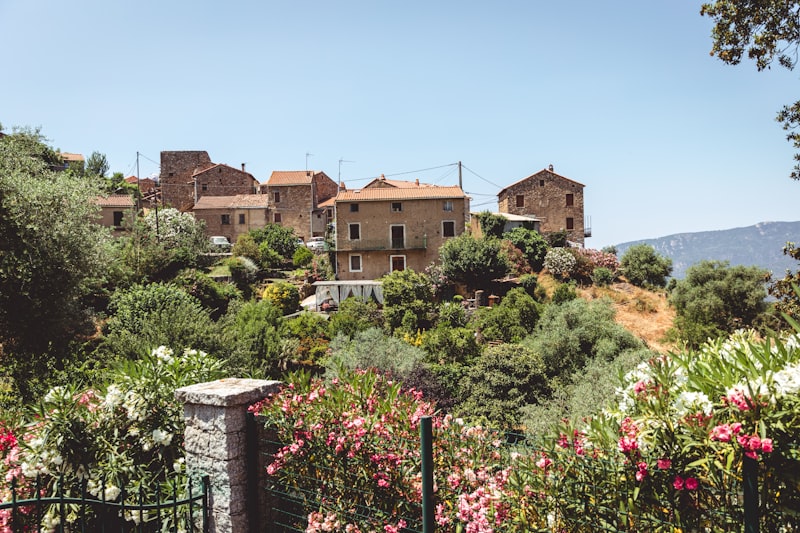
Corsica, an enchanting island nestled in the azure waters of the Mediterranean Sea, holds a captivating allure for travelers worldwide. But have you ever wondered which country this mesmerizing gem belongs to? Let’s embark on a journey of discovery and unveil the answer to this intriguing question.
Corsica, with its rugged mountains, pristine beaches, and rich cultural heritage, is an integral part of the European continent. Located west of Italy, southeast of France, and north of the island of Sardinia, Corsica is an autonomous region of France. As one of the 18 regions of France, it enjoys a unique status within the country.
While Corsica is officially part of France, it possesses a distinct identity shaped by its history, geography, and language. The island has a long and storied past, having been ruled by various civilizations throughout the ages. From the ancient Greeks and Romans to the Genoese and Pisans, Corsica’s strategic location made it a coveted territory.
In the late 18th century, Corsica became famous as the birthplace of Napoleon Bonaparte, whose impact on history remains unparalleled. Despite its ties to France, Corsica has preserved its own customs, traditions, and even a regional language known as Corsican, which is closely related to Italian.
Today, Corsica combines the best of both worlds: the French influence evident in its administrative structure, education system, and legal framework, and the distinctive Corsican character that permeates everyday life. Visitors to the island can indulge in a delightful blend of French and Corsican cuisine, explore charming villages perched on hillsides, or hike through the stunning landscapes of the Corsican Regional Nature Park.
So, if you’re planning a trip to this captivating Mediterranean jewel, remember that Corsica belongs to France but boasts a vibrant culture and identity of its own. Immerse yourself in the island’s beauty, savor its unique flavors, and embrace the spirit of Corsica—a land where history, nature, and enchantment converge.
Territorial Tensions: The Ongoing Debate Surrounding Corsica’s National Identity
Corsica, a picturesque island nestled in the Mediterranean Sea, has long been a subject of intense debate when it comes to its national identity. With its rich history, diverse culture, and distinct language, Corsica has faced territorial tensions that have shaped its quest for autonomy. In this article, we will delve into the ongoing discourse surrounding Corsica’s national identity.
One cannot ignore the historical context that has influenced Corsica’s struggle for recognition as a distinct entity. Over the centuries, the island has been under the rule of various powers, including the Genoese Republic and the French Empire. These periods of foreign domination have left an indelible mark on Corsican society and have fueled aspirations for self-determination.
At the heart of the debate lies the Corsican language, which holds significant cultural and symbolic value for the island’s inhabitants. Corsican, a Romance language closely related to Italian, serves as a powerful tool for preserving Corsica’s unique heritage. Advocates argue that promoting the use of the Corsican language is essential for safeguarding the island’s cultural identity and fostering a sense of belonging among its people.
Furthermore, economic factors play a crucial role in the ongoing debate. Corsica heavily relies on tourism, attracting visitors with its pristine beaches and charming hilltop villages. However, some locals fear that increased tourism may lead to a dilution of their customs and traditions. Balancing the need for economic growth with the preservation of cultural authenticity remains a complex challenge.
Another element fueling the territorial tensions is the issue of political autonomy. The Corsican nationalist movement seeks to obtain greater control over the island’s affairs, advocating for measures such as increased regional powers and the recognition of Corsica as a separate nation. Proponents argue that granting more autonomy to Corsica would allow for tailored solutions to address the unique needs and challenges facing the island.
Corsica’s ongoing debate surrounding its national identity reflects the complexities of a region with a rich history and vibrant culture. As territorial tensions persist, Corsica grapples with questions of language preservation, economic development, and political autonomy. Finding a balance between these factors will be crucial for Corsica’s future as it navigates its path towards self-determination.
Corsica: Caught Between Two Nations, the Struggle for Autonomy Continues
Have you ever wondered about the unique island of Corsica? Nestled in the Mediterranean Sea, this enchanting place has a rich history and a passionate quest for independence. Corsica finds itself caught between two nations – France and Italy – as it strives for autonomy. Let’s delve into the intriguing details of this ongoing struggle.
Corsica, an island known for its breathtaking landscapes and vibrant culture, has a long-standing desire for self-governance. It is home to a distinct ethnic group called the Corsicans, who have their own language and customs. Despite being part of France since 1769, the island has maintained a strong sense of identity separate from its mainland counterpart.
The struggle for autonomy in Corsica dates back several decades. The National Liberation Front of Corsica (FLNC), a militant separatist group, emerged in the 1970s. Their aim was to end French rule and establish an independent Corsican state. Through acts of violence and bombings, they sought to draw attention to their cause.
Over the years, the situation has evolved, and Corsica now enjoys a level of regional autonomy within the framework of France. In 1991, the French government granted the island a degree of self-rule, allowing Corsica to have its own assembly and president. However, some Corsicans believe that this autonomy falls short of true independence, and the struggle persists.
The demands for autonomy stem from various factors. Corsica possesses valuable natural resources and a thriving tourism industry. Many Corsicans argue that managing these resources themselves would bring economic benefits and preserve their unique cultural heritage. They envision a future where decisions affecting their island are made locally, rather than dictated by a distant central government.
Despite the growing support for autonomy, there are also concerns and divisions within Corsican society. Some fear the potential consequences of complete separation from France, such as economic instability and isolation. Others question whether an independent Corsica could effectively address the challenges of global politics and maintain stability in a rapidly changing world.
As Corsica continues its struggle for autonomy, the island remains a captivating example of the complexities inherent in identity and self-determination. It serves as a reminder that the quest for independence is not simply about political borders, but also about cultural pride, economic aspirations, and the desire to shape one’s own destiny.
Corsica stands between two nations, yearning for greater autonomy. Its unique history, cultural distinctiveness, and economic potential fuel this ongoing struggle. Whether Corsica will eventually achieve complete independence or find a balance within its current arrangement remains to be seen. But one thing is certain – the spirit of Corsican determination and resilience continues to captivate those who admire a people caught between two worlds, yet steadfastly pushing for their rightful place on the map of nations.
The Corsican Conundrum: Uncovering the Historical and Political Complexities
Introduction:
Have you ever wondered about the enigmatic island of Corsica? Nestled in the Mediterranean Sea, this captivating place is known for its stunning landscapes and vibrant culture. However, beneath its picturesque facade lies a rich tapestry of historical and political complexities that have shaped its identity over the centuries. Let’s embark on a journey to unravel the intriguing Corsican conundrum.
The Island’s Turbulent Past:
Corsica’s history is a mosaic of conquests, struggles, and resistance. From ancient times, it has been a coveted land, witnessing the rise and fall of various civilizations. It was home to the Phoenicians, Greeks, Romans, Vandals, and Byzantines before becoming part of the powerful Republic of Genoa. The islanders’ longing for independence ignited rebellions, culminating in the Corsican Republic in 1755 under the leadership of Pasquale Paoli.
Napoleon: A Corsican Icon:
Perhaps the most famous figure associated with Corsica is Napoleon Bonaparte. Born in Ajaccio, the charismatic military strategist went on to shape the course of European history. Despite leaving an indelible mark on the world stage, Napoleon’s complex relationship with his birthplace remains a subject of debate. His legacy, both admired and contested, embodies the duality of Corsican identity.
Political Struggles and Autonomy:
Corsica’s political landscape has long been characterized by tensions between those seeking greater autonomy and those advocating for integration. The National Liberation Front of Corsica (FLNC) emerged in the 1970s, resorting to violence in its pursuit of independence. In recent years, Corsica has gained a measure of self-governance within France, with the establishment of a territorial collectivity and recognition of the Corsican language.
Cultural Heritage and Resilience:
The Corsican people are fiercely proud of their unique cultural heritage. From traditional polyphonic singing to vibrant festivals, their customs and traditions have been preserved through generations. The island’s rugged beauty has also attracted artists, writers, and filmmakers who seek inspiration in its untamed landscapes.
Conclusion:
Corsica remains a captivating enigma, a land that defies easy categorization. Its history is a testament to the resilience and determination of its people, who have navigated complex political landscapes while preserving their distinct identity. Exploring the Corsican conundrum unveils a story of struggle, triumph, and a fierce love for the land they call home.
Corsica’s Enduring Quest for Independence: A Deep Dive into the Island’s Struggle
Have you ever wondered about the fascinating history of Corsica and its relentless pursuit of independence? In this article, we will take a deep dive into the struggles faced by this beautiful Mediterranean island in its quest for self-governance. From historical events to present-day aspirations, Corsica’s enduring fight for independence is a captivating tale that continues to shape its identity.

Nestled in the azure waters of the Mediterranean Sea, Corsica has been inhabited for thousands of years. Its strategic location made it a coveted prize for various empires throughout history, leading to a turbulent past. Despite being under foreign rule for centuries, the Corsicans have never abandoned their desire for autonomy and self-determination.
One pivotal moment in Corsica’s fight for independence was the birth of Pasquale Paoli, a prominent figure who emerged during the 18th century. Paoli led a rebellion against Genoese rule and established a democratic government, making Corsica the first modern republic in Europe. However, this newfound freedom was short-lived, as the island eventually fell under French control.
Since then, Corsica has experienced periods of unrest and occasional violence as separatist movements gained momentum. These movements, driven by a strong sense of Corsican identity, aim to preserve the island’s unique culture, language, and traditions. While some argue that autonomy within the French framework is sufficient, others advocate for complete independence.
Today, Corsica enjoys a degree of regional autonomy, with its own elected assembly and limited legislative powers. The island has made significant progress in preserving its heritage, promoting the Corsican language, and protecting its natural environment. However, the quest for full independence remains an ongoing struggle, with passionate debates and occasional demonstrations serving as reminders of Corsica’s unwavering determination.
The road to independence is not without challenges. Economic concerns, integration within the European Union, and a complex relationship with France all play significant roles in shaping Corsica’s future. Nevertheless, the island continues to captivate the world with its breathtaking landscapes, vibrant culture, and the indomitable spirit of its people.
Corsica’s enduring quest for independence is a testament to the island’s rich history and resilient population. From Pasquale Paoli’s rebellion to present-day debates, the Corsicans’ fight for self-governance has left an indelible mark on their identity. As they navigate the complexities of the modern world, Corsica stands as an inspiring example of a community striving to maintain its uniqueness while seeking a future that aligns with its aspirations.